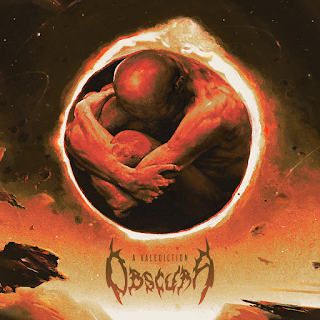Obscura - "A Valediction" (2021)

Zdawać się mogło, że zachowawczość z "Diluvium" dała do zrozumienia Steffenowi Kummererowi, że pora na większe zmiany. No i poniekąd...coś w tym jest! Cóż, zespół Steffena potrzebował świeżości już od pewnego czasu. Po wydaniu "Diluvium" - dość standardowo jak na Obscurę - nie ostał się bowiem nikt poza samym mózgiem grupy, Kummererem, a sama muzyka pozostawiała trochę do życzenia. Tym razem, Steffen na szczęście nie przefolgował z tymi zmianami personalnymi i muzycznymi (o czym zaraz) oraz postanowił pójść fanom na rękę, zapraszając - w większości - technicznych wizjonerów z "Cosmogenesis", tj. Christiana Münznera i Jeroena Paula Thesselinga, a w roli perkmana obsadzając zupełnie nowego dla grupy Davida Diepolda (wcześniej live'owy drummer Benighted i Hate). Z nimi, Obscura wzbiła się na wyraźnie wyższy poziom niż na "Diluvium" oraz wprowadziła kilka nowych elementów, które znacząco odświeżyły, nieco przeoraną już, stylistykę.
Owe nowości to większy nacisk na neoklasyczne wymiatanie i...pojawienie się melo-deathowych brzmień rodem z Gothenburga! No i tak, o ile zwiększony poziom trzepanki, z pozoru, nie wydaje się niczym ekstrawaganckim (w kontekście tej kapeli), tak patenty melo-deathowe bardzo ciekawie urozmaicają wcześniejszy styl (bo nie dominują też nad całością). Zmienił się chociażby wokal Steffena (bliższy skrzeczenia a la Tomas Lindberg, ale rzecz jasna, bez odrzucania niższych growli), poszczególne melodie (sic!) na bardziej skandynawsko brzmiące, a do całości zawitały galopady, których nie powstydziłyby się nawet takie grupy jak Dark Tranquility czy In Flames (np. w "When Stars Collide" czy "In Unity"). Poza tym, firmowe patenty także zdały tu egzamin (mimo że jest znacznie mniej cynikowania). Okej, czasami zdarza się, że zespół za bardzo odpływa w zbyt wyrafinowane ("Forsaken", "Solaris") czy nawet radiowe rejony (mam na myśli fragmenty w "When Stars Collide", gdzie pojawia się Björn "Speed" Strid z Soilwork). Nie zmienia to jednak faktu, że "A Valediction" jako całość zawiera masę interesujących zagrywek gitarowych, ciekawej progresji, subtelnego, bezprogowego basu czy fajnych pomysłów na melodie. Wystarczy rzucić uchem na "The Neuromancer", "Heritage", "Orbital Elements II" czy "Devoured Usurper" (tu ukłon w stronę "Ocean Gateways").
Tym sposobem, Obscura pokazała, że ma pomysł na siebie i że jest w stanie zaskoczyć po nieco bardziej standardowym dla siebie krążku, wprowadzając nowinki lekko modyfikujące styl. Udało im się tego bowiem dokonać bez utraty tożsamości czy udziwniania. Przez to też, "A Valedicition" jeszcze bardziej zyskuje w ogólnym rozrachunku - mimo że parę rzeczy byłbym skłonny na nim pozmieniać.
Ocena: 8/10
[English version]
It seemed that the conservatism of "Diluvium" made Steffen Kummerer understand that it was time for bigger changes. And...so it happened! Well, Steffen's band needed some freshness for a while now. After the release of "Diluvium" - quite standard for Obscura - only the brain of the group, Kummerer, remained, and the music itself also left a bit to be desired. This time, Steffen, fortunately, did not indulge in these personal and musical changes (more on that later) and decided to listen to the fans wish, inviting - mostly - technical visionaries from "Cosmogenesis", i.e. Christian Münzner and Jeroen Paul Thesseling, and as a drummer cast a completely new for the group David Diepold (previously live drummer Benighted and Hate). With them, Obscura soared to a much higher level than on "Diluvium" and introduced a few new elements that significantly refreshed their style.
These novelties are a greater emphasis on neoclassical sweeping and...the appearance of melo-death sounds straight from Gothenburg! Well, while the increased level of the technical mastery does not seem to be anything extravagant (in the context of this band), the melo-death patents very interestingly diversify the earlier style (because they do not dominate the whole cd). For example, Steffen's vocal has changed (closer to a screech a la Tomas Lindberg, but of course, without rejecting the lower growls), individual melodies (sic!) to sound more Scandinavian, and galloping, which even groups such as Dark Tranquility or In Flames would not be ashamed of, were present (e.g. in "When Stars Collide" or "In Unity"). Besides, classic patents also worked here (even though here is much less Cynic-like patterns). Okay, sometimes it happens that the band drifts too far away into too sophisticated ("Forsaken", "Solaris") or even radio regions (I mean fragments in "When Stars Collide", where Björn "Speed" Strid from Soilwork appears) . However, it does not change the fact that "A Valediction" as a whole contains a lot of interesting guitar patents, interesting progression, subtle, fretless bass or nice ideas for melodies. Just listen to "The Neuromancer", "Heritage", "Orbital Elements II" or "Devoured Usurper" (a reference to "Ocean Gateways").
In this way, Obscura showed on "A Valediction" that they have an idea for themselves and that they are able to surprise after a slightly more standard album, introducing novelties that slightly modify the style. They managed to do it without losing their identity or adding weirdness. Due to this, "A Valedicition" gains even more overall - even though I would like to change a few things on it.
Rating: 8/10



Coś mi nazwa mówi, chyba jakiś czas temu coś od nich słuchałem. Nie mniej każda zmiana stylistyki bez porzucania zupełnie podstaw stylu zespołu to coś wartego uwagi.
OdpowiedzUsuńPozdrawiam!
https://mozaikarzeczywistosci.blogspot.com